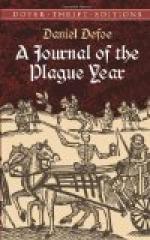[304] “One another,” by a confusion of constructions, has been used here for “them.”
[305] By a statute of Charles II. a chaldron was fixed at 36 coal bushels. In the United States, it is generally 261/4 hundredweight.
[306] Opening.
[307] “To seek,” i.e., without judgment or knowledge.
[308] Mixing.
[309] Him.
[310] This unwary conduct.
[311] Think.
[312] Were.
[313] Accept.
[314] Personal chattels that had occasioned the death of a human being, and were therefore given to God (Deo, “to God”; dandum, “a thing given"); i.e., forfeited to the King, and by him distributed in alms. This curious law of deodands was not abolished in England until 1846.
[315] The southern coast of the Mediterranean, from Egypt to the Atlantic.
[316] Censure.
[317] Afterward.
[318] “Physic garden,” i.e., a garden for growing medicinal herbs.
[319] Since.
[320] Lord mayor of London, 1679-80, and for many years member of Parliament for the city.
[321] The workmen.
[322] Recognized.
[323] Fenced.
[324] Members of the Society of Friends, a religious organization founded by George Fox about 1650. William Penn was one of the early members. The society condemns a paid ministry, the taking of oaths, and the making of war.
[325] See p. 105, next to the last paragraph.
[326] Die. “Of the plague” should immediately follow “died.”
[327] See Note 3, p. 26. {Transcriber’s note: the reference is to footnote 26.}
[328] The act of indemnity passed at the restoration of Charles II. (1660). In spite of the King’s promise of justice, the Parliamentarians were largely despoiled of their property, and ten of those concerned in the execution of Charles I. were put to death.
[329] Family and personal peace.
[330] The Established Church of England, nearly all of whose ministers were Royalists. The Presbyterians were nearly all Republicans.
[331] The dissenting ministers.
[332] The Churchmen.
[333] Of.
[334] What we should call an assistant minister is still called a curate in the Church of England.
[335] “I had not said this,” etc., i.e., I would not have said this, but would rather have chosen, etc.
[336] See Rev. vi. 8.
[337] Moved away (into the country).
[338] The duties of headboroughs differed little from those of the constables. The title is now obsolete.
[339] Count.
[340] “Must.” In this sense common in Chaucer. The past tense, “should,” retains something of this force. Compare the German sollen.
[341] Otherwise known as theriac (from the Greek [Greek: theriakos], “pertaining to a wild beast,” since it was supposed to be an antidote for poisonous bites). This medicine was compounded of sixty or seventy drugs, and was mixed with honey.




